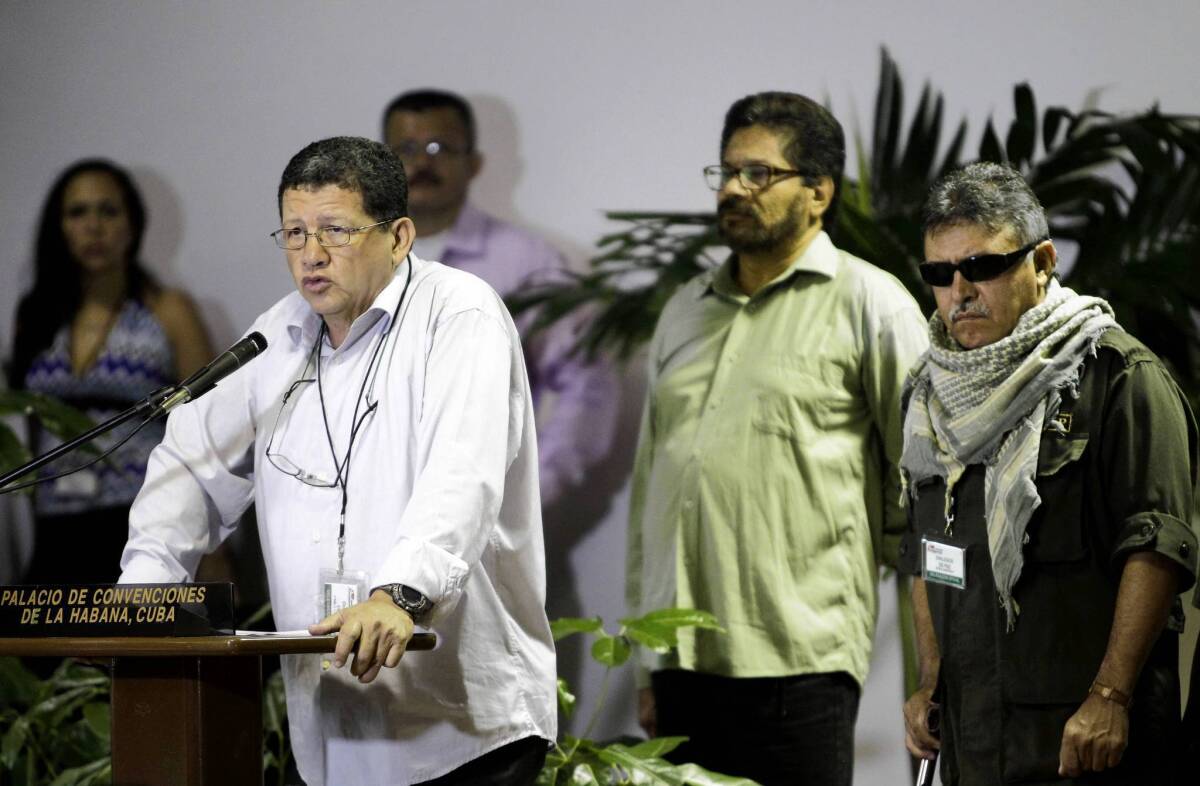Pressure growing on Colombia and FARC rebels to reach a peace deal

- Share via
BOGOTA, Colombia — With the public’s patience wearing thin, pressure is mounting on the Colombian government and the FARC rebel group to make substantive progress in peace talks that have bogged down over how to fashion a political role for the insurgents.
On Saturday, the two sides will complete their 12th bargaining session in Havana since the negotiations began in October. Only the first of six bargaining issues on the agenda — an agrarian reform initiative — has been settled, and observers see little chance of a breakthrough on the second: the mechanics of the rebels making the transition from warfare to post-conflict democracy.
Big differences separate the sides. The Revolutionary Armed Forces of Colombia, or FARC, has said it wants a new constitutional convention and a postponement of next year’s presidential election, demands the government categorically rejects. Officials may be willing to offer the FARC a certain number of congressional seats, another of its demands, but the number is far less than the rebels believe they deserve, analysts say.
Whatever form a final accord might take, it would be put to Colombians for approval in a nationwide referendum, the government has said.
“We are at a difficult moment, an impasse,” said Rodrigo Uprimny, director of the Bogota-based think tank DeJusticia. “The dialogue is tangled up in this [political participation] theme and it’s not easy to see an exit.”
When President Juan Manuel Santos announced his peace initiative last year, he promised the negotiations would take “months, not years,” an effort to ease the public’s concern that the FARC would stall for time to regroup. That was the case the last time the two sides tried for peace, during the three-year Caguan talks, which ended in failure in 2002.
Negotiators in Havana took seven months to hammer out the agrarian reform piece. With complex topics still pending, including justice, victims’ rights, drug trafficking, ending the conflict and putting the accord into force, the November deadline seems a pipe dream.
In a radio interview Monday, Santos acknowledged that the negotiations might need more time. “Deadlines in these processes are totally counterproductive,” he said, setting a different tone than a year ago.
Encouraging for some analysts is that the FARC seems serious about reaching a deal. The agreement on agrarian reforms in May is the first rebel-government accord of any kind since the FARC took up arms in 1964, analysts said. Moreover, the rebels are considering giving way on issues, such as disarmament, that in previous peace talks were non-starters.
Although far from vanquished, the FARC has taken a beating over the last decade from Colombia’s modernized armed forces, which have benefited from U.S. weaponry and technology under the $8-billion aid program known as Plan Colombia. Several top rebel leaders have been killed and the FARC’s ranks have been cut by more than half to 8,000 fighters, according to Defense Ministry estimates.
“The time is ripe for the rebels to understand they cannot win militarily and to follow the lead of other Latin American revolutionary movements and move into the political sphere,” said Francisco Gutierrez, a professor at Bogota’s National University of Colombia. Despite the obstacles, he said, he is moderately optimistic that a peace deal will be signed.
Bruce Bagley, an international relations professor at the University of Miami, doubts that peace will be achieved in Havana, but he said Santos’ commitment to the negotiations could mean that Colombia’s chances for peace might never be better.
“I understand the motivations driving Santos,” Bagley said. “He would love to be the president of peace, win the Nobel Peace Prize and go down in history as the man who removed the ‘war surtax,’ if you like, of the 1% to 2% growth per year that this struggle against the FARC has cost the Colombian economy for the last 40 years.”
But slow progress in Havana and rising public resistance to concessions the government might offer the FARC have hurt Santos in the polls. The public is ambivalent about the process, Gutierrez said, with a broad sector wanting an end to the conflict but not wanting to “pay for peace” by giving the rebels legislative seats or limited amnesty for war crimes.
Amnesty for most rebels, as well as members of the armed forces, accused of war crimes is part of the Legal Framework for Peace law passed by Colombia’s Congress this year. It’s now under review by the nation’s Constitutional Court.
A government-commissioned panel, the National Center for Historical Memory, said last month that 220,000 people had died in Colombia’s conflict since 1958, many of them at the hands of the FARC.
“The idea of the FARC participating in politics is more than a lot of Colombians can swallow,” said Adam Isacson, a researcher with the Washington Office on Latin America, a think tank. “People think, ‘Why should these guys get privileges when they used violence and kidnapping all these years?’”
Colombians such as former President Alvaro Uribe, who was Santos’ boss when he was defense minister but now heads the leading opposition coalition, take the hard-line position that peace can be won only on the battlefield, not at the negotiating table.
Bagley said amnesty could be a “deal breaker” because “I’m not sure Colombians’ forgiveness goes that far.”
Kraul is a special correspondent.
More to Read
Sign up for Essential California
The most important California stories and recommendations in your inbox every morning.
You may occasionally receive promotional content from the Los Angeles Times.













